Kerala, known as “God’s Own Country,” is a top-notch tourist destination not only for Indians but also for people across the world. The unparalleled natural beauty of the southernmost state of India is, of course, the biggest draw.
We had an amazing opportunity to spend some good days in Kerala. We attended the Kerala Travel Mart, explored Kochi, marvelled at the traditional crafts of Kerala, and chilled in the hills of Munnar with homemade chocolates. Needless to say, we also sampled a wide variety of Kerala cuisine during the trip.
Lately, the idea of “One India” is doing the rounds. We hope that is just a political notion in the milieu of the ongoing elections. During the courses of our travels, we have realized that any cuisine in India is influenced by locally available products and the weather. We shudder to think the impact of any forced homogeneity would do to the vibrant food palate of India.
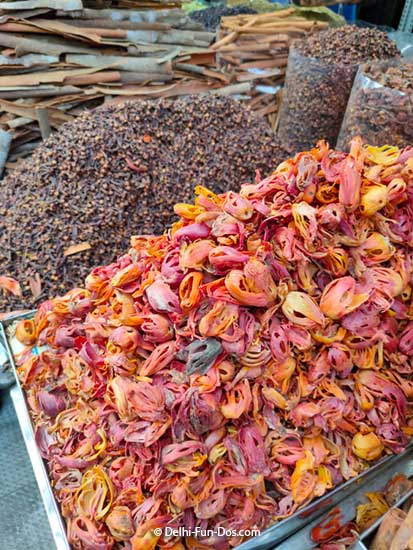
Kerala cuisine is heavily influenced by coastal produce such as coconuts and fish and peppered not only with pepper (apparently among the best in the world) but a host of prized spices. Bananas serve as a fruit as well as a commonly used cooking ingredient. We realise not just taste, but balance of the nutritive elements is the key philosophy in Kerala food.
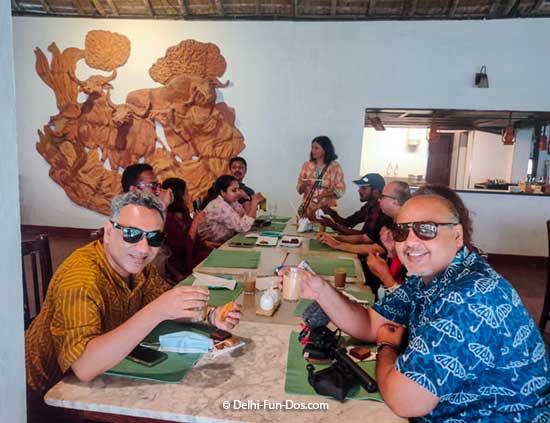
Being big fans of slow travel that is gaining ground in India, regional food is a great way to know a place. Your trip to Kerala would remain incomplete if you haven’t tasted the local cuisine that is rich in ingredients as well as aromatic spices. Here is a quick Kerala food guide to the must-have items when you visit. These items are easily available in the markets in the cities of Kerala at affordable prices. We have tasted many of these preparations in Delhi. However, these tasted very different when we ate in Kerala.
Contents
Sadya in Kerala
You should not miss Sadya, the traditional Kerala feast. Sadya is prepared during festivals like Onam and Vishu. However, some restaurants in Kochi and other cities offer Sadya for daily lunch at affordable rates. You might have tasted Sadya elsewhere, but you must try it in Kochi.
Pin it for later Read
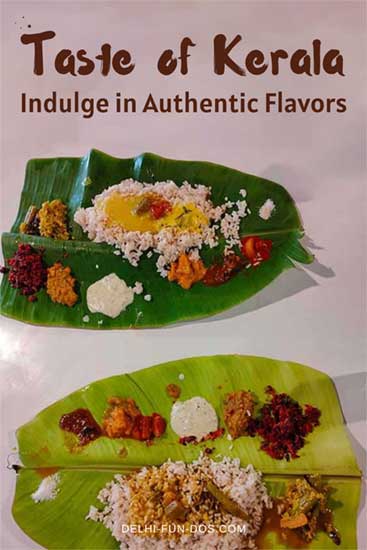
This multicourse meal is served on a banana leaf, one item at a time. The items include an assortment of dry and gravy vegetable curries, pickles, and relishes. Buttermilk is served on the side. Sadya is a feast of flavors where every element balances taste and nutrition. Our Sadya was served with reddish warm herbal water. Infused with the herb Pathimugam, this drink is believed to be an antidote for waterborne diseases.
Puttu and Kadala Curry
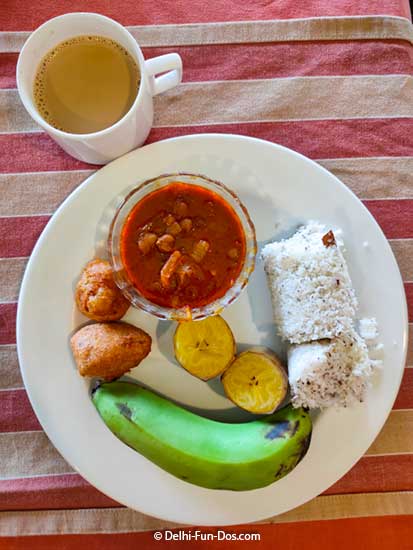
Pronounced somewhat like “patt”, Puttu is a steamed rice cake topped with grated coconut. It is a common side during breakfast with Kadala, a chickpea curry spiced with mustard, garlic, curry leaves, and grated coconut. This is a typical Malayali breakfast combination served on a banana leaf. Every element in the dishes balances each other, resulting in a riot of taste buds.
Boiled Banana
A unique accompaniment with Puttu Kadala breakfast is boiled bananas. A selection of bananas is boiled with their peels and served during breakfast. The boiling softens the banana further and enhances the sweetness. This banana is peeled before consumption and it balances the spices of the Puttu Kadala.
Pazham Pori or Ethakka Appam
Pazham Pori is a banana fritter served with tea or coffee. You can find this dish at snack joints in any market. A slice of ripe banana is dipped in a rice flour batter and deep-fried in coconut oil, the common cooking medium in Kerala. The item is flavoured with cardamom powder. The crisp coating gives way to the sweetness of the soft-cooked banana inside with a melt-in-the-mouth texture. The taste is minimally sweet and a single piece can sustain you for a while.
Malabar Paratha
Malabar Paratha, also popular as Kerala Paratha or Parotta, is a layered flat bread that is made with flour and roasted with white oil or ghee. The dough is seasoned with a dash of salt as well as sugar. Thus, the flaky paratha has a sweet after-taste that we like. What do you eat Malabar Paratha with? In Delhi, we have had Malabar Paratha with non-vegetarian chicken or mutton dishes. But in Kerala, it is served with any vegetarian or non-vegetarian curry or even vegetable stew.
Kottu Paratha
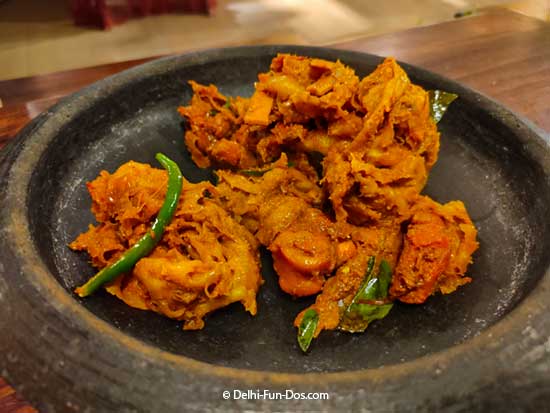
Kottu Paratha is popular in Kerala, Tamil Nadu, and even South Asian countries like Singapore and Malaysia. We had the best Kottu Paratha in Kochi. This shredded version of fried flat bread or paratha is tempered with Salan or gravy and flavoured with the great Kerala spices. We had it with Kerala-style egg curry, which is a must-try on its own, but the Kottu Paratha, soft and crispy, would work as a full dish on its own. It came in a milk canister and was served in a stone bowl transforming this essentially street food into a sheer gourmet experience.
Idiyappam
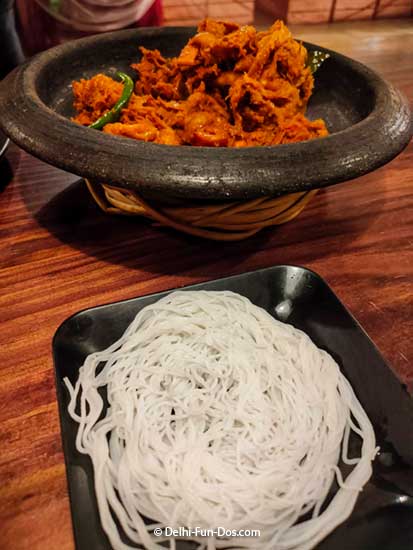
This is a main course dish in South India made of rice-floor noodles, flattened into a disc and steamed. When served, it looks like a white nest on the platter. Idiyappam is a popular healthy breakfast or lunch item and is had with curries. But we love the Kerala version of Idiyappam where it is often served with coconut milk, jaggery or with any milk-based dessert. We have tried Idiyappam is Delhi as well but the Kerala versions are way more tender with bigger serving size. Idiyappam is quite the proverbial soul-food that is tasty yet not harmful for the system.
Calicut Halwa
Calicut or Kozhikode Halwa is a soft, jelly-like sweet that comes in a variety of colors. It has fruits, nuts, and spices mixed in a flour dough with coconut shavings sprinkled on top. While Halwa is prepared in ghee in most parts of India, the Calicut halwa is prepared in coconut oil, lending a distinctive flavor.
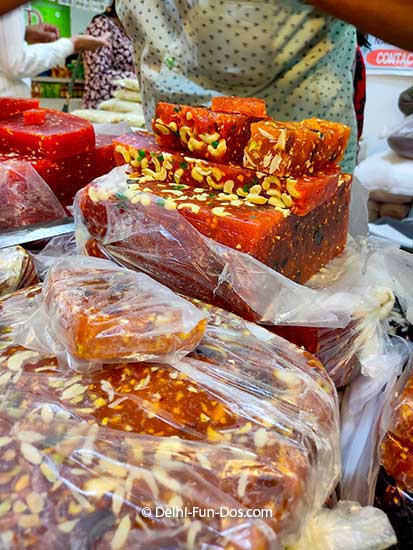
We have been big fans of Calicut halwa for years and would buy a variety of flavors from the India International Trade Fair. The ones we tasted in Kerala were softer and less sweet. Needless to mention, we packed a big lot and carried that home.
Nendran Banana Chips of Kerala
You might have tried banana chips before and might be wondering how different they can be. For that, you need to visit any banana chip stall in Kerala. Contrary to popular notion, it is not raw banana that is used. In Kerala, they use the Nendran banana and make slivers with a device especially used for this purpose. The sliced bananas are then deep-fried in coconut oil. The result is gold coin-lookalike chips that are soft and crisp with no pressure on dentures.
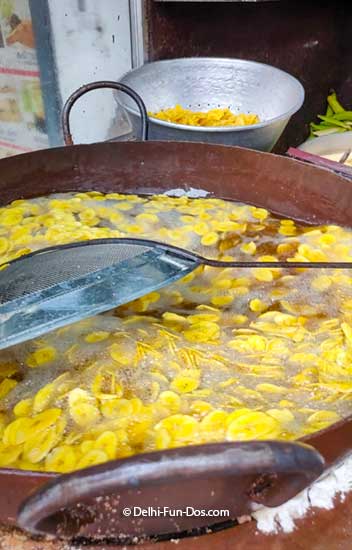
We loved that very little seasoning was used and we got freshly prepared Kerala banana chip packs for gifts at home.
Sarkara Puratti or Kerala Jaggery Banana Chips
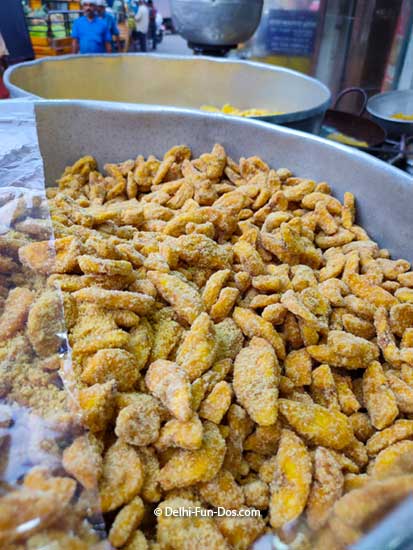
Bedabrata, true to his Bengali genes, prefers the sweeter version of banana chips. Chunks of banana are dipped in jaggery paste and fried in coconut oil. The final pieces are harder than savoury banana chips. But the mild cardamom-flavoured sweet banana treats, with a surprise hint of pepper, are worth the effort.
Munnar Homemade Chocolate
The hills of Munnar in Kerala are one of the largest producers of cocoa beans in the world. Chocolates are, therefore, like a cottage industry here with various households making dark, white, and chocolate with nuts, raisins, dry fruits, and exotic fillings such as jellies and mango pulps.
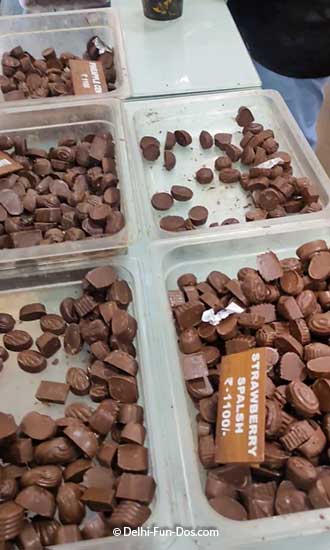
We went to a chocolate factory and almost made a meal tasting the huge selection. Rich in milk, and with an endless range, somehow every filling made the chocolate different. We carried back big packets as gifts and for home consumption. We could go back to Munnar just for the chocolates.
Meen Moilee
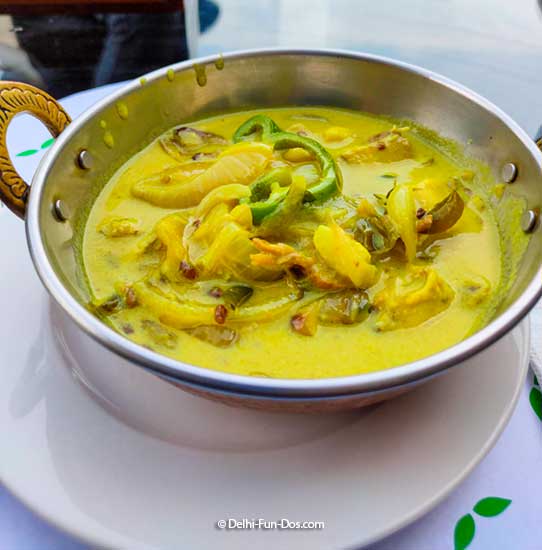
Kerala cuisine has a rich repertoire of non-vegetarian dishes. Being a coastal state, fish is routinely consumed here. Meen means fish in Sanskrit and Moilee is Malayali for stew. So the Meen Moilee is a fish dish cooked in coconut and tomato gravy. The result is an aromatic creamy mouthful that we loved with rice.
Kerala Fish Fry
If you are a fan of coastal food, you must try the Kerala fish fry. It is a simple dish where fish steak pieces are marinated with ginger, garlic, onion paste, chilli powder, pepper, and any other spice that is available. The pieces are then fried in coconut or any other white oil. The result is a crunchy surface with tender and juicy inside that melts on your tongue while setting it on fire. Our mouth waters while we type this para.
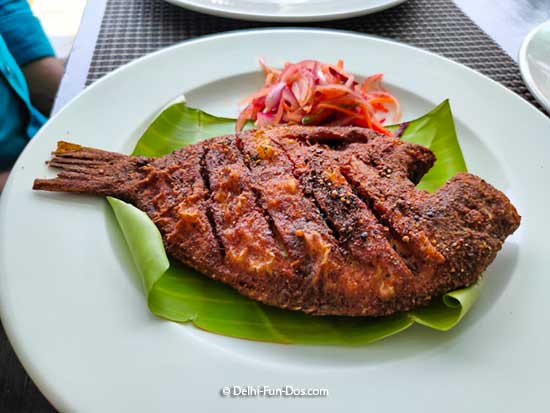
This dish is widely available in restaurants. Also, there are fishermen in the Fort Kochi area who sell raw fish and then fry it for you if you wish. That is going boho at a gastronomic level we say.
Chicken Ishtu And Appam
Another non-vegetarian favorite is Chicken Ishtu, a chicken stew where chicken pieces and vegetables are cooked in coconut milk gravy. Spiced with curry leaves, cloves, cardamom, and bay leaf, it is the ultimate comfort food. It is enjoyed with Appam, a fermented rice batter pancake that is tender with a slight tart aftertaste. It is the perfect side to the fragrant sweetish Ishtu.
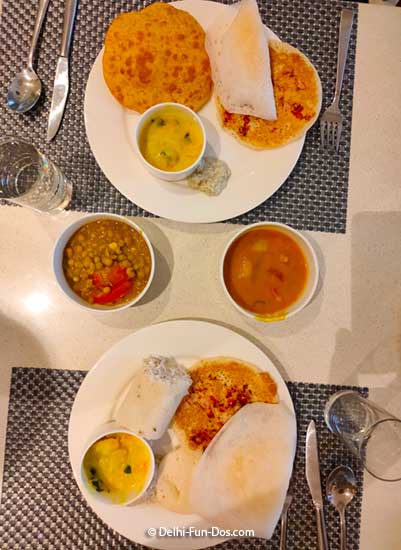
Kerala cuisine reflects the region’s rich cultural heritage, offering a culinary journey that celebrates health, diversity, and authenticity. Embrace the gastronomic wonders of Kerala and embark on a culinary adventure that promises to tease your taste buds and captivate your senses. From the coastal bounty of Meen Moilee to the indulgent sweetness of Calicut Halwa, Kerala’s culinary treasures are worth every calorie. So, venture forth and savour the flavors of “God’s Own Country,” for they are as diverse and enchanting as the land itself.
Kerala Travel Mart – KTM 2024
KTM 2024 (Kerala Travel Mart), one of India’s largest B2B travel events, is set to take place from 26th to 29th September 2024 in Kochi, Kerala. This prestigious event highlights Kerala as a must-visit destination for travelers and tourists worldwide. Known for its diverse culture, food, and hospitality, Kerala continues to grow as one of India’s top tourist destinations, and KTM plays a pivotal role in promoting the state on the global stage.
The Kerala Travel Mart Society, founded in 2002 with the goal of promoting tourism in the state, established KTM as a platform for travel agents from across the globe to connect with local service providers. This collaboration has not only enhanced tourism in Kerala but has also introduced a more professional approach to the state’s tourism industry. What makes KTM stand out is its unique focus on a single state, setting it apart as a specialized travel mart.
KTM 2024 will bring together buyers and sellers from India and abroad, providing a platform for networking, forging new connections, and taking Kerala’s travel and tourism industry to new heights. If you’re involved in the travel business, this is the event to attend.
P.S. This post is in collaboration with Kerala Travel Mart Society, Kerala Tourism, the Government of Kerala, and Incredible India. Our wholehearted thanks for the riveting experiences.

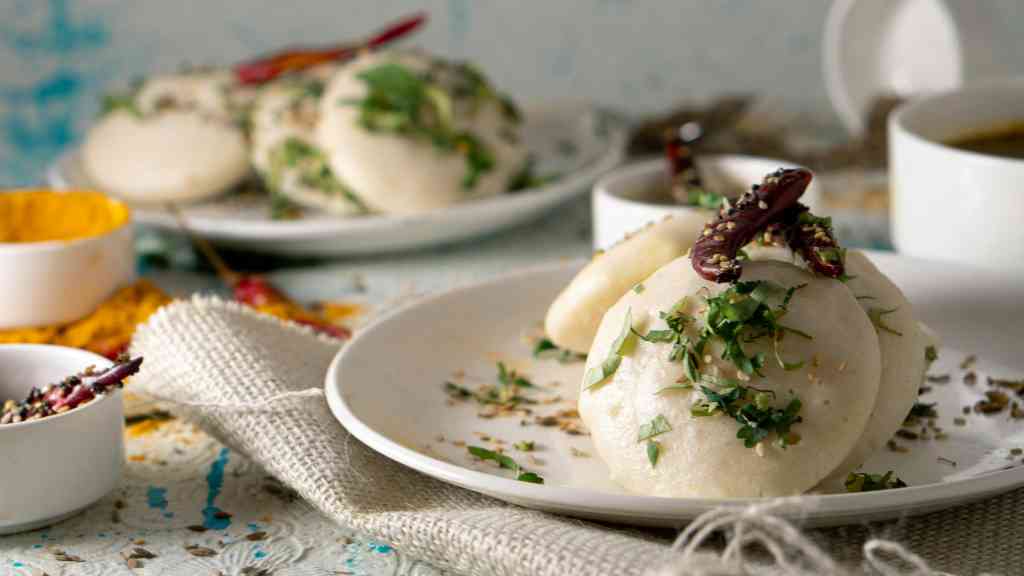
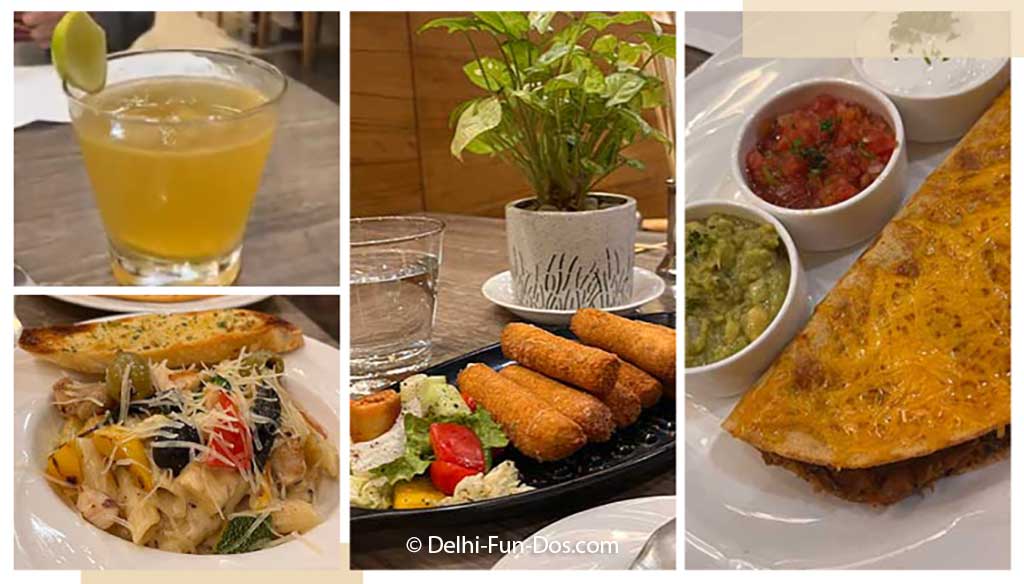
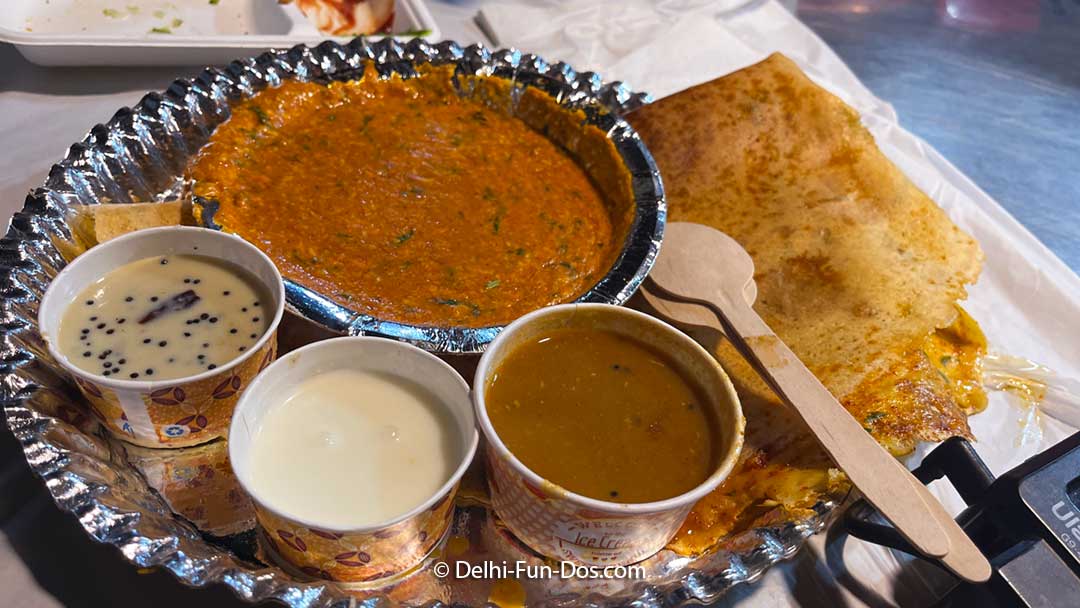
Your adventure not only inspires wanderlust but also ignites a craving for the authentic tastes of Kerala. Thank you for sharing your culinary escapade
Our pleasure. Kerala is a delight to all senses.
This article truly captures the essence of Kerala cuisine! 😍 From the aromatic Sadya to the crispy Pazham Pori, each dish is a culinary delight. Your detailed descriptions make me feel like I’m right there tasting every flavor. Thanks for sharing this mouthwatering journey!
So glad to know. We love our culinary trips across India.
Kerala is a gorgeous place, and the food there is AMAZING! I still think about the delicious meals I had while visiting in 2018.
Can’t agree more.
Wow, food from Kerala looks so yummy! I’m a big fan of Indian food, so it makes sense that this would be amazing.
This post beautifully captures the essence of authentic tastes and traditions. Thank you for inviting us to savor the rich culinary heritage of Kerala!
You post really captures Kerala cuisine. I like how their food reflects their cultural heritage. So when you eat is not just about the food, but you’re having a whole cultural experience!
So aptly put!
Thanks for the look at this culture and it’s fascinating food. When I travel, I always try the local foods.
Same!
Your piece on Kerala’s authentic flavors is a delightful journey through culinary richness. The vivid descriptions and friendly tone invite readers to savor every word, leaving them eager to explore these delicious tastes!
Totally!
I must say your description of Kerala’s food is making my mouth water! The Idiyappam and Calicut Halwa sound like amazing treats I would love to try. I also find it interesting that the Nendran banana is used for the banana chips fried in coconut oil. The Sarkara Puratti or Kerala Jaggery Banana Chips sound like a perfect blend of sweet and spicy. Munnar Homemade Chocolate seems like a must-try for any chocolate lover. As for the non-vegetarian dishes, the Meen Moilee and Kerala Fish Fry sound flavorful. The chicken ishtu and appam also seem like a great combination. Thank you for sharing this delightful culinary journey through Kerala!
Pleasure!
These foods and food festivals look amazing! I completely agree that the things that make different regions distinct need to be preserved and celebrated.
Agree
I’ve been to Malaysia but did not try this but hopefully when I go there will definitely make sure to try this.